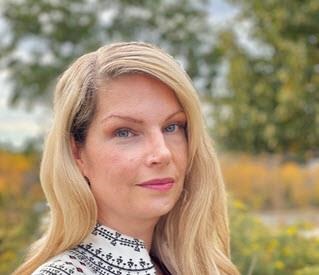The first study is about farm stressors and coping strategies.
“We want to know what the current baseline of farmers is right now,” she told Farms.com. “So, five years from now I can look back and identify if we need improvements or have to pivot on something.”

Rebecca Purc-Stephenson.
This study will also help with creating training sessions for healthcare providers about how to engage with farmers, she said.
The second study will focus on livestock epidemics and the affects those have on farmers.
In Alberta, for example, avian flu has affected 1.3 million birds as of Nov. 3, the Canadian Food Inspection Agency says.
“The process of depopulation, when a farmer has to cull an entire flock or herd, even though some of the animals might be otherwise healthy, can be very distressing,” she said. “And right now there aren’t a lot of supports or understanding about what a farmer needs or how that kind of event might change their farming practices.”
Study number three will revolve around farm transition.
In the 2021 Census of Agriculture, 125,492 farms reported having no succession plan.
Of that number, 25,332, or about 20 per cent of Canadian farms without a succession plan, are in Alberta.
Navigating a farm transition can be challenging, Purc-Stephenson said.
“You’ve got the people who are retiring trying to let go of the farm and let the next generation make mistakes and make the farm their own now,” she said. “Whenever I talk with people about this, they tell me it’s a mess. Not only do the farmers need support on this but also people like financial planners will need tools to help families through these transitions.”
The fourth of the five studies Purc-Stephenson is conducting will be a full risk assessment.
This study is going to take a full baseline of programs and services geared towards farmers.
“We’re not just looking at the quantity of programs, but the quality as well,” she said. “We want to see if there’s more programs in five years after there’s been more knowledge and awareness raised. The goal is to do some resource mapping to find out where these services are, and if you’re someone who works at a social service agency, you can find out who to contact if you want to start up some programming for the ag community.”
And the final study will focus on therapists.
The goal is to create a listing of therapists and counsellors who have agricultural backgrounds or who have worked with members of the ag community and can share those experiences with other support workers.
“So, when we refer people to our site, they’ll be in contact with people who can understand them,” she said. “We want to shorten the time it takes for farmers to find help and receive proper diagnostics. Some of the things that might work in a big city may not be applicable for a farmer or someone living in a rural community.”
Purc-Stephenson also brings an agricultural background to her work.
She grew up in Ontario and her family raised sheep and boarded horses. And while in university she worked on a large turkey operation.
Looking back on her time on farms, she recognizes some of the stresses producers are faced with.
“I’m recognizing now where mental health issues were present and how anxiety manifests itself on the farm” she said. “But it was a different time, and in the 90s and early 2000s we didn’t talk about mental health, and we probably should have.”
Purc-Stephenson and her team will officially be launching the studies in January.
At that time, farmers will be able to submit their names and contact information if they wish to participate in the research.